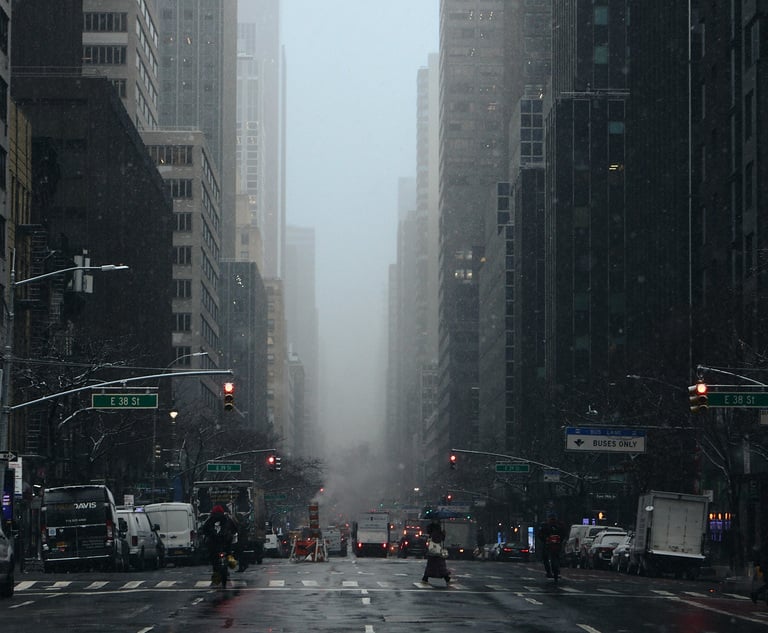Is Standing Jurisdictional to Be Raised First Time on Appeal?—Part II
Part I, yesterday, began the analysis of whether standing has a jurisdictional impact by examining the epicenter of appellate review, the doctrine of preservation, standing, subject matter jurisdiction, and the treatment of standing in the First Department. Part II continues the analysis.
July 09, 2018 at 02:30 PM
14 minute read

Second Department
In Wells Fargo Bank Minnesota, Nat. Ass'n v. Mastropaolo , 42 AD3d 239 [2d Dept 2007], a mortgage foreclosure action, the Second Department held that lack of standing to commence an action is a defense that is waived if not raised in an answer, or in a pre-answer motion to dismiss the complaint, ergo nonjurisdictional. Mastropaolo , in a lengthy analysis, stated that the First and Third Department rulings that standing goes to subject matter jurisdiction rendered this issue “unsettled”:The reasoning underlying [the First and Third Department] decisions is that where there is no aggrieved party, there is no genuine controversy, and where there is no genuine controversy, there is no subject matter jurisdiction. These decisions cannot be reconciled with the Court of Appeals authority cited above. Moreover, they confuse a plaintiff's right to recovery with the court's power to hear the case. A court lacks subject matter jurisdiction when it lacks the competence to adjudicate a particular kind of controversy in the first place. As the Court of Appeals has observed, “[t]he question of subject matter jurisdiction is a question of judicial power: whether the court has the power, conferred by the Constitution or statute, to entertain the case before it” (Fry v. Village of Tarrytown, 89 N.Y.2d 714 ... ). Whether the action is pursued by the proper party is an issue separate from the subject matter of the action or proceeding, and does not affect the court's power to entertain the case before it.
Mastropaolo quoted the Court of Appeals' lament, in Lacks v. Lacks , 41 N.Y.2d 71 [1976] , over the “elastic” usage of the term “jurisdiction,” citing the residence requirement in Domestic Relations Law Section 230:“Jurisdiction is a word of elastic, diverse, and disparate meanings. A Statement that a court lacks 'jurisdiction' to decide a case may, in reality, mean that elements of a cause of action are absent. Similarly, questions of mootness and standing of parties may be characterized as raising questions of subject matter jurisdiction. But these are not the kinds of judicial infirmities to which CPLR 5015 (subd. [a], par. 4) [providing for relief from a judgment or order] is addressed. That provision is designed to preserve objections so fundamental to the power of adjudication of a court that they survive even a final judgment or order.In Thrasher v. United States Liab. Ins. Co., 19 N.Y.2d 159 ... this Court, in discussing subject matter jurisdiction, drew a clear distinction between a court's competence to entertain an action and its power to render a judgment on the merits. Absence of competence to entertain an action deprives the court of 'subject matter jurisdiction'; absence of power to reach the merits does not” (Lacks, at 74–75 ... ). The Supreme Court “is a court of general jurisdiction, and is competent to entertain all causes of action [] unless its jurisdiction has been specifically proscribed” (Thrasher ... at 166).
In Manhattan Telecom. Corp. v. H & A Locksmith, Inc. , 21 NY3d 200, 203 [2013], the court, referenced Lacks only to the extent of correcting the “loose” use of “jurisdiction” when applied to “elements of a cause of action [that] are absent”: “[I]t is necessary to understand [“jurisdiction”] in its strict, narrow sense. So understood, it refers to objections that are 'fundamental to the power of adjudication of a court.'” Justice Alan Scheinkman, Practice Commentaries, C230:1, explains that the ruling in Lacks stemmed from “confusion [that] crept in as a result of early holdings that construed DRL § 230 as being jurisdictional in nature. The theory [] was that, since jurisdiction in matrimonial actions is limited to that conferred by statute, a failure to meet the statutory residence requirements divested the court of subject matter jurisdiction.” Section 230 was imposed as a policy precaution “to prevent the courts [] from becoming 'divorce mills'” when the grounds for divorce were liberalized. ( Lacks , 74.) Standing is entirely irrelevant to this concern. The Second Department continues to hold that “A party's lack of standing does not constitute a jurisdictional defect and does not warrant sua sponte dismissal of a complaint by the court.” HSBC Bank USA, N.A. v. Taher , 104 AD3d 815 [2d Dept 2013]; Davis v. Delena , 70 NYS3d 82, 83, 70 N.Y.S.3d 82 [2d Dept 2018].The appellants' contention that the plaintiff failed to establish, prima facie, that it has standing to commence the action because it failed to demonstrate that it was the holder of the note and mortgage at the time of the commencement of the action is not improperly raised for the first time on appeal.
The Third Department
The Third Department, like the First Department, has held that standing is and is not waivable: Standing may be waived and does not go to subject matter jurisdiction: Plainview-Old Bethpage Congress of Teachers v. New York State Health Ins. Plan, 133 AD3d 1140 [3d Dept 2015]; Castillo v. Luke, 63 AD3d 1222 [3d Dept 2009] (mother now claims that the father did not have standing to seek visitation); CNB Realty v. Stone Cast, Inc., 127 AD3d 1438 [3d Dept 2015] (foreclosure). Citing the U.S. Supreme Court ( Allen v. Wright , 468 U.S. 737 [1984]) and other authority, earlier Third Department decisions held that “standing goes to the jurisdictional basis of a court's authority to adjudicate a dispute” which may be raised sua sponte first time on appeal: Axelrod v. New York State Teachers' Retirement Sys ., 154 AD2d 827 [3d Dept 1989]; Battenkill Ass'n of Concerned Citizens v. Town of Greenwich Planning Bd., Washington County , 156 AD2d 863 [3d Dept 1989]; Eaton Assoc., Inc. v Egan , 142 AD2d 330 [3d Dept 1988].Aggrievement Is Jurisdictional
In Saratoga County Chamber of Commerce, Inc. v. Pataki , 100 NY2d 801, 812 [2003], the court explained standing in language of aggrievement: “The rules governing standing help courts separate … the genuinely aggrieved from the judicial dilettante or amorphous claimant.” Settled law at all levels recognizes aggrievement as jurisdictional: Leeds v. Leeds , 60 NY2d 641 [1983] (“On the Court's own motion, appeal dismissed upon the ground that appellant is not a party aggrieved (CPLR 5511).)”); Mixon v. TBV, Inc. , 76 A.D.3d 144 [2d Dept. 2010] (“The procedural posture of the case presents a threshold issue concerning an essential element of appellate jurisdiction, i.e., the question of aggrievement.”); Klinge v. Ithaca College , 235 A.D.2d 724 [3d Dept 1997] (“The requirement that an appellant be an aggrieved party is jurisdictional and subject to the court's threshold review, even if the issue has not been raised by the respondent.”); Dolomite Products Co., Inc. v. Town of Ballston , 151 AD3d 1328 [3d Dept 2017] (“Aggrievement is a central but, more importantly, a necessary component to invoke this Court's jurisdiction ... [I]f a party is not aggrieved, then this Court does not have jurisdiction to entertain the appeal.”) Aggrievement, as a jurisdictional principle, should be deemed to subsume a would-be party's ab initio standing to seek the relief from which he, she or they eventually may appeal. It is difficult to comprehend that a party may seek an appeal from a denial of relief that the party had no right to seek and was not entitled to in the first place. [ Telaro. ]Genuine Controversy, Advisory Opinions Are Jurisdictional
Mastropaolo's challenge to the First and Third Departments regarding “genuine controversy” is refuted by decisions from the Court of Appeals which predate Mastropaolo , that genuine controversy is a component of advisory opinions, which is, in turn, a component of subject matter jurisdiction (syllogism). Advisory opinions contravene “the jurisdiction of this Court [which] extends only to live (genuine) controversies ... We are thus prohibited from giving advisory opinions or ruling on 'academic, hypothetical, moot, or otherwise abstract questions.' ” Saratoga Count [2003]. In Community Bd. 7 of Borough of Manhattan v. Schaffer , 84 NY2d 148 [1994], Part I, the court tied standing to impermissible advisory opinions: “[T]he standing analysis is, at its foundation, aimed at advancing the judiciary's self-imposed policy of restraint, which precludes the issuance of advisory opinions”, which per Saratoga , is jurisdictional. Socy. of Plastics stated: “The requirement of injury in fact ['aggrievement'] for standing purposes is closely aligned with our policy not to render advisory opinions ... Injury in fact thus serves to define the proper role of the judiciary.” “[T]he jurisdiction of this Court extends only to live controversies ... [, and w]e are thus prohibited from giving advisory opinions ...”, Harris v. Seneca Promotions, Inc ., 149 AD3d 1508, 1509 [4th Dept 2017], rearg denied, 151 AD3d 1968 [4th Dept 2017], citing Saratoga . Advisory opinions goes to subject matter jurisdiction. Monroe County Pub. School Districts v. Zyra , 51 AD3d 125, 129 [4th Dept 2008].Standing, Justiciability Implicates Jurisdiction
In New York State Inspection, Sec. and Law Enf't Employees, Dist. Council 82, AFSCME, AFL-CIO v. Cuomo , 64 NY2d 233 [1984], the court explained justiciability:Justiciability is the generic term of art which encompasses discrete, subsidiary concepts including, inter alia, political questions, ripeness and advisory opinions. At the heart of the justification for the doctrine of justiciability lies the jurisprudential canon that the power of the judicial branch may only be exercised in a manner consistent with the “judicial function” (emphasis provided).
In Community Board 7 [1994], the court held: “Standing is an element of the larger question of 'justiciability.'” “Whether a person seeking relief is a proper party to request an adjudication is an aspect of justiciability which must be considered at the outset of any litigation.” Dairylea Coop., Inc. v. Walkley , 38 NY2d 6 [1975], also Socy. of Plastics . “The 'justiciable controversy' upon which a declaratory judgment may be rendered requires [] that the plaintiffs in such an action have an interest sufficient to constitute standing to maintain the action ...” Am. Ins. Ass'n v. Chu , 64 NY2d 379 [1985]. S ocy. of Plastics held that “[s]tanding is a threshold determination, resting in part on policy considerations, that a person should be allowed access to the courts to adjudicate the merits of a particular dispute that satisfies the other justiciability criteria ... ”—the court quotes this language in Assn. for a Better Long Is., Inc. v. New York State Dept. of Envtl. Conservation , 23 NY3d 1 [2014]; also, Roberts v. Health and Hosps. Corp ., 87 AD3d 311 [1st Dept 2011]; Eastview Properties, Inc. v. Town of Chester Planning Bd. , 138 AD3d 838 [2d Dept 2016]; and Broadway-Flushing Homeowners' Ass'n, Inc. v. Dilluvio , 97 AD3d 614 [2d Dept 2012]. In Uhlfelder v. Weinshall , 47 AD3d 169 [1st Dept 2007], the First Department, citing Socy. of Plastics , affirmed standing sua sponte because it is “the core requirement that a court can act only when the rights of the party requesting relief are affected ... [it] is central to justiciability.” Citing New York State Inspection , the Third Department held that “justiciability [is a] matter[] pertaining to subject matter jurisdiction which can be raised at any time.” New York Blue Line Council, Inc. v. Adirondack Park Agency , 86 AD3d 756, n. 4 [3d Dept 2011]; 333 Cherry LLC v. N. Resorts, Inc ., 66 AD3d 1176, n. 5 [3d Dept 2009]; also Citizen Review Bd. of City of Syracuse v. Syracuse Police Dept ., 150 AD3d 121 [4th Dept 2017], citing Community Board 7 of Borough of Manhattan.Conclusion
Fundamentally, a party's standing has no bearing on a court's subject matter competence. However, power over the matter alone is insufficient. Subject matter jurisdiction and standing combine two discrete and conjunctive jurisdictional probes, each vital to the court's ultimate adjudicatory power over the dispute. It is critical to be mindful of the court's jurisprudential admonition in Telaro v. Telaro, 25 N.Y.2d 433 [1969]: “No party should prevail on appeal, given an unimpeachable showing that he had no case in the trial court.” The cautionary language is broadly worded and not restrictively, it must subsume a party's threshold right to seek relief. The inconsistent case law is “unsettling.” The Court of Appeals' recent pronouncements on standing as “the threshold issue” [ Socy. of Plastics; Saratoga County Chamber of Commerce; Assn. for a Better Long Is. ], as “critical to the proper functioning of the judicial system” [ Saratoga County Chamber of Commerce ] and going to justiciability [ Community Board 7 ] demonstrate a forward-thinking approach toward standing. There has been no elastic use of the term jurisdiction in these cases. The combination of these cases outweigh Fossella v. Dinkins , 66 NY2d 162 [1985]; Dougherty v. City of Rye , 63 NY2d 989 [1984]; and Prudco Realty Corp. v. Palermo , 60 NY2d 656 [1983], which held standing is waivable. Standing should thus be permissible first time on appeal. Elliott Scheinberg is a member of NYSBA Committee on Courts of Appellate Jurisdiction. He is the author of Contract Doctrine and Marital Agreements in New York, NYSBA, (3d ed. 2016). He is also a Fellow of the American Academy of Matrimonial Lawyers.This content has been archived. It is available through our partners, LexisNexis® and Bloomberg Law.
To view this content, please continue to their sites.
Not a Lexis Subscriber?
Subscribe Now
Not a Bloomberg Law Subscriber?
Subscribe Now
NOT FOR REPRINT
© 2025 ALM Global, LLC, All Rights Reserved. Request academic re-use from www.copyright.com. All other uses, submit a request to [email protected]. For more information visit Asset & Logo Licensing.
You Might Like
View All

New York State Authorizes Stand-Alone Business Interruption Insurance Policies
6 minute read
Rejuvenation of a Sharp Employer Non-Compete Tool: Delaware Supreme Court Reinvigorates the Employee Choice Doctrine
8 minute read
Trending Stories
- 1States Accuse Trump of Thwarting Court's Funding Restoration Order
- 2Microsoft Becomes Latest Tech Company to Face Claims of Stealing Marketing Commissions From Influencers
- 3Coral Gables Attorney Busted for Stalking Lawyer
- 4Trump's DOJ Delays Releasing Jan. 6 FBI Agents List Under Consent Order
- 5Securities Report Says That 2024 Settlements Passed a Total of $5.2B
Who Got The Work
J. Brugh Lower of Gibbons has entered an appearance for industrial equipment supplier Devco Corporation in a pending trademark infringement lawsuit. The suit, accusing the defendant of selling knock-off Graco products, was filed Dec. 18 in New Jersey District Court by Rivkin Radler on behalf of Graco Inc. and Graco Minnesota. The case, assigned to U.S. District Judge Zahid N. Quraishi, is 3:24-cv-11294, Graco Inc. et al v. Devco Corporation.
Who Got The Work
Rebecca Maller-Stein and Kent A. Yalowitz of Arnold & Porter Kaye Scholer have entered their appearances for Hanaco Venture Capital and its executives, Lior Prosor and David Frankel, in a pending securities lawsuit. The action, filed on Dec. 24 in New York Southern District Court by Zell, Aron & Co. on behalf of Goldeneye Advisors, accuses the defendants of negligently and fraudulently managing the plaintiff's $1 million investment. The case, assigned to U.S. District Judge Vernon S. Broderick, is 1:24-cv-09918, Goldeneye Advisors, LLC v. Hanaco Venture Capital, Ltd. et al.
Who Got The Work
Attorneys from A&O Shearman has stepped in as defense counsel for Toronto-Dominion Bank and other defendants in a pending securities class action. The suit, filed Dec. 11 in New York Southern District Court by Bleichmar Fonti & Auld, accuses the defendants of concealing the bank's 'pervasive' deficiencies in regards to its compliance with the Bank Secrecy Act and the quality of its anti-money laundering controls. The case, assigned to U.S. District Judge Arun Subramanian, is 1:24-cv-09445, Gonzalez v. The Toronto-Dominion Bank et al.
Who Got The Work
Crown Castle International, a Pennsylvania company providing shared communications infrastructure, has turned to Luke D. Wolf of Gordon Rees Scully Mansukhani to fend off a pending breach-of-contract lawsuit. The court action, filed Nov. 25 in Michigan Eastern District Court by Hooper Hathaway PC on behalf of The Town Residences LLC, accuses Crown Castle of failing to transfer approximately $30,000 in utility payments from T-Mobile in breach of a roof-top lease and assignment agreement. The case, assigned to U.S. District Judge Susan K. Declercq, is 2:24-cv-13131, The Town Residences LLC v. T-Mobile US, Inc. et al.
Who Got The Work
Wilfred P. Coronato and Daniel M. Schwartz of McCarter & English have stepped in as defense counsel to Electrolux Home Products Inc. in a pending product liability lawsuit. The court action, filed Nov. 26 in New York Eastern District Court by Poulos Lopiccolo PC and Nagel Rice LLP on behalf of David Stern, alleges that the defendant's refrigerators’ drawers and shelving repeatedly break and fall apart within months after purchase. The case, assigned to U.S. District Judge Joan M. Azrack, is 2:24-cv-08204, Stern v. Electrolux Home Products, Inc.
Featured Firms
Law Offices of Gary Martin Hays & Associates, P.C.
(470) 294-1674
Law Offices of Mark E. Salomone
(857) 444-6468
Smith & Hassler
(713) 739-1250






